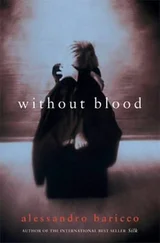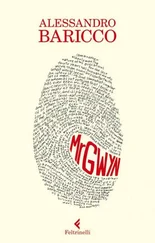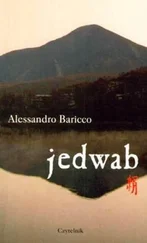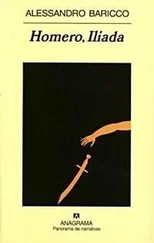When they opened the door at home, the Mother started shrieking something silly but very joyful. The Father approached the man and asked him to explain. At the end he shook his hand, or hugged him, I don’t remember, and asked if we could do something for him. Yes, he said, I’m very tired, would you mind if I sit down here for a moment to sleep? Then I’ll go. He lay down on the sofa, without even waiting for the answer. And he fell asleep. He hasn’t left since, because he’s still sleeping, and because it would be tremendously sad to see him leave. It was the Son who first called him “Uncle,” a few days later. He remained “Uncle,” forever.
The young Bride thought for a while.
You don’t even know who he is, she said.
No. But when I marry him he’ll tell me everything.
Wouldn’t it be right to have him tell first and then, eventually, marry him?
I tried.
And he?
He went on sleeping.
And it is what I more or less continued to do when the Doctor, in an intolerable outburst of the obvious, told me that the heart of the problem lay in my inability to understand who I am. When I remained silent, the Doctor repeated the obvious, maybe expecting that in some way I would react, for example by explaining who I was, or by admitting, instead, that I didn’t have the slightest idea about it. But in reality what I did was continue to nap for a while. Then I got up and wearily headed toward the door, saying that our collaboration ended there. I recall using exactly those words, even if they now seem to me excessively formal. He burst out laughing, but it was a forced laugh, probably called for by the books, something studied, something that seemed to me so intolerable that it goaded me to an unexpected action — as much for the Doctor as for me. That is to say, I grabbed the first thing that came to hand — a table clock of moderate dimensions but with sharp edges, and solid — and hurled it at the Doctor, hitting him right in the shoulder, not in the head as the newspapers erroneously reported, with the result that he fainted, it’s not clear if out of pain or out of surprise. Nor is it true that later I kicked him savagely, as one newspaper, which has hated me for years, claimed — or at least I don’t remember having done that. Some extremely unpleasant days followed, in which I refused to release any statement at all, tolerating every sort of intolerable gossip, and being charged, without particular interest, with assault. Understandably, since then I’ve shut myself in the house, limiting my outings to the strictly necessary and sinking slowly into a solitude by which I’m frightened and, at the same time, protected.
I have to admit that, judging from the photos that came to me from my lawyer, it would seem that I really did strike the Doctor in the head. What aim.
The road was already dark when they returned, the Daughter with her Cubist gait, the young Bride with her mind on certain vague thoughts of her own.
They pretended not to notice, but the truth is that the deliveries began to become less frequent, leaving empty, nameless days, according to rhythms that seemed irrational and so somewhat inconsistent with the mind of the Son as they had known it. An Irish harp arrived, and the next day two embroidered tablecloths. But then nothing, for two days. Sacks of seeds one Wednesday, and nothing until Sunday. A yellow tent, three tennis racquets, but in between four days of nothing. When an entire week passed without a single ring from the post office by which to measure the time of the wait, Modesto decided to ask, respectfully, for a meeting with the Father. He had prepared his opening sentence with care. It was in line with the Family’s deep-rooted inclinations, which were historically alien to any sort of pessimism.
You must surely have noted, sir, a certain slowing down of the deliveries recently. I wondered if it might not be the case to deduce from that the imminent arrival of the Son.
The Father looked at him silently. He was coming from distant thoughts, but he registered on some peripheral edge of his mind the beauty of loyalty to a style, often more visible in servants than in masters. He ratified it with an imperceptible smile. But since he remained silent, Modesto went ahead.
I happened to notice, on the other hand, that the last morning telegram is from twenty-two days ago, he said.
The Father, too, had noticed it. He wouldn’t have been able to fix an exact day, but he knew that at a certain point the Son had stopped reassuring the Family about the outcome of his nights.
He nodded yes, with his head. Yet he remained silent.
In the strict interpretation that he gave to his work, Modesto considered being silent in the presence of a master to be an excessively intimate practice, and so he avoided it systematically by resorting to a couple of elementary operations: asking permission to leave, or continuing to speak. Usually he preferred the first. That day he risked the second.
So, if you will allow me, I would begin to plan the preparations for his arrival, to which I would like to devote all my attention, given the affection I have for the Son and considering the joy that seeing him again will bring to the whole household.
The Father was almost moved. He had known that man forever, so at that moment he was perfectly able to understand what he was really saying, in the reverse of his words, with an irreproachable generosity and elegance. He was saying that something was going wrong with the Son, and he was there to do everything necessary to see that the rule that in those rooms did not permit anyone to give in to sorrow was not broken. Probably he was also reminding him that his devotion to the Son was such that no task would have seemed to him inappropriate if the purpose was that of tempering his fate.
So the Father remained silent — touched by that man’s proximity. By the intelligence, by the control. He was, just that afternoon, measuring his own solitude and, looking at Modesto, was aware of seeing in him the only person who in those hours inhabited with dignity the open landscape of his distress. And in fact, at moments like those, when we are called on to endure secret, or not easily expressed, sorrows, it’s secondary characters, of programmatic modesty, who from time to time break the isolation we have forced ourselves into, with the result that we find ourselves, as happened to me only a few days ago, granting strangers irrational entrance to our labyrinth, in the childish illusion of being able to gain from it a suggestion, or an advantage, or even just a fleeting balm. In my case, I’m ashamed to say, it was the stock boy in a supermarket who was meticulously placing some frozen foods in the right case — but I wouldn’t know exactly what to call it — his hands reddened with cold. I don’t know, it seemed to me that he was doing something similar to what I ought to do, analogously, to the case of my soul — but I wouldn’t know exactly what to call it. I ended up telling him. I was pleased to see that he didn’t stop working while he said he wasn’t sure he had understood clearly. So I explained better. My life is broken, I said, and I can’t get the pieces back into place. My hands are getting colder and colder, I haven’t been able to feel anything for a while, I told him. He must have thought he was dealing with a lunatic, and in fact that was the first time I thought I might go mad — an eventuality that the Doctor, foolishly, felt he could exclude, before I hit him with the clock. The secret is to do it every day, the supermarket stock boy told me. You do something every day, and so it becomes easy. I do it every day, I don’t even notice anymore. Is there something you do every day? he asked me. I write, I said. How nice. What do you write? Books, I said. Books about what? Novels, I said. I don’t have time to read, he said — it’s what they always say. Of course, I understand, I said, it’s not serious. I have three children, he said — maybe it was a justification, but I took it instead as the start of a dialogue, as an authorization to exchange something, and so I explained to him that, odd as it might seem, I could put pieces of a book one on top of the other without even looking at them, I just have to touch them with my fingertips, so to speak, while the same operation becomes impossible when I apply myself to the pieces of my life, with which I can’t construct anything that has a sensible form — or even just refined, if not pleasant — and this in spite of the fact that it’s an activity I devote myself to practically every day, and so many days by now that, you know, I told him, my hands are frozen, I don’t feel anything anymore.
Читать дальше












